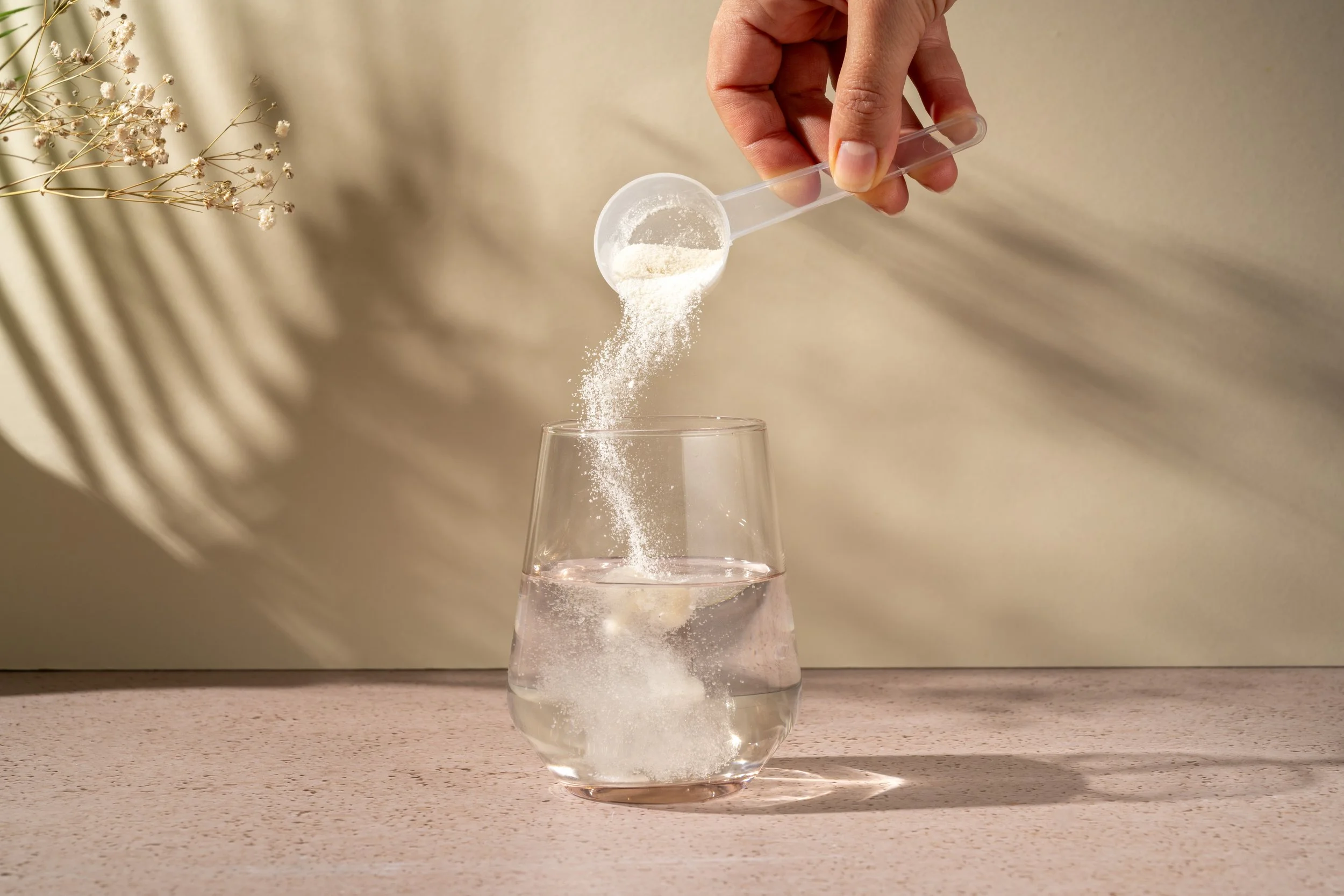Feature: The Collagen Connection
The collagen market is seeing healthy growth, with much hype around its benefits, but as demand grows so do questions around sourcing, sustainability and efficacy, writes Jane Wolfe.
Praised for boosting muscle mass, strengthening bones, easing joint pain and benefiting skin, collagen is increasingly popular, backed by celebrities such as Davina McCall and Victoria Beckham. Reflecting this, the UK market is set to hit £556 million by 2030, representing annual growth of 10.2%, with hydrolyzed collagen expected to dominate [Grand View Research].
“Collagen is a vital protein that is abundant in the body and provides structure, strength and support to muscles, bones, skin and connective tissues,” explains Catherine Farrant, founder of Ossa Organic whose offer includes collagen, gelatine powders and bone broths. “It’s an excellent protein and so beneficial for all ages — from growing children, young adults and the elderly.”
Although naturally produced by the body, collagen levels peak at around age 25, thereafter declining by 1.5% annually. This decline is more rapid after 45, with menopause bringing an additional dip, so an ageing UK population is helping drive interest in collagen-rich supplements and foods.
“I’m a strong advocate for collagen, because we know from the way we used to eat that the human body thrives when collagen is a part of the diet,” says Farrant. “Before processed foods took over, people ate more meat and broth stocks and gelatinous cuts like knuckle, shin and lamb neck — all rich in natural collagen.”
Hot item
Collagen is a big seller for Vicky Perks of Beanfreaks, Cardiff, whose customers’ focus is split between beauty and arthritis, ‘with post-menopause joint care being a growing area’.
“There’s a lot of chatter on social media and in the press – customers are starting to understand its importance. We stock a few different collagens. Natures Aid does a fab range, particularly its Collagen Liquid, Hunter & Gather’s beef and marine collagens are trusted by customers and I am very fond of NaturesPlus Collagen Peptides, featuring collagen from egg, beef, fish and chicken.”
While more independent research is needed — as yet it has no approved EU health claims — some studies are encouraging. One review led by Taipei Medical University of 26 randomized controlled trials found that supplementing with hydrolyzed collagen improved skin hydration and elasticity, and researchers from Liverpool John Moores University observed that supplementing with hydrolyzed collagen before resistance exercise increased collagen synthesis.
Know your source
Any time a health trend leads to a profusion of new products, consumers need to consider environmental and ethical credentials as well as efficacy. One investigation by the Bureau of Investigative Journalism, The Guardian, ITV and O Joio e O Trigo linked the bovine collagen industry to deforestation and human rights violations in Brazil.
“Not all collagens are created equal — some can come from fish farms or from animals that are raised in less than ideal conditions,” warns Farrant. “We’re committed to educating our customers. Shopping for collagen should be approached with the same care as shopping for meat, chicken or fish.
“Our collagen is ethically sourced from cattle raised on pasture or range for 365 days per year with free access to grass, air, land and water. Free from hormones, antibiotics and anabolic steroids.”
Format options
While powders offer high single doses, Perks’ customers like the convenience of capsules and liquid. “I've seen some interesting RTD collagens aimed at the menopause market, and they’re good, but the bigger sales will remain with capsules and powders.”
Because it dissolves in hot and cold liquids, collagen is easily integrated into customers’ daily lives, as is gelatine – the same protein but hydrolyzed differently. “I stick to gelatine for marshmallows, vitamin gummies and hot cacao, and use collagen in just about everything – smoothies, pancakes, cake batter and more,” says Farrant.
Collagen is only derived from animal sources, so for vegans and veggies who want a boost, ingredients such as vitamin C, amino acids and essential minerals can support natural collagen production, and many supplements meet this brief.
Beanfreaks stocks options including Viridian’s Collagen Pro Factors activator complex and Terranova’s Vollagen, which also incorporates a range of joint and skin health-supporting ingredients. Perks also recommends Raw Sport’s Collagen Building Protein Peptides, which is especially popular with the store’s ‘resident vegan kickboxer Zoe as an amazing sports recovery aid’.
Collagen innovations
GEN Collagen has launched as the UK’s first sparkling on-the-go collagen drink, offering 8g of marine collagen per can along with 100% RDA vitamin C. The tasty ‘pick-up-and-go’ drink is available in Digest Apple & Ginger and Natural Energy Orange & Passionfruit variants.
Boasting a new and improved recipe, Hunter and Gather’s Rise & Glow Collagen is a mixed berry flavoured daily beauty tonic with 5g of wild caught marine collagen per serving, along with hyaluronic acid and 40mg of vitamin C. It is gluten-, dairy- and sweetener-free and keto and paleo-friendly.
For bone broth fans, Kallø has launched a Chicken Bone Broth, providing 4g of collagen and 2g of protein. The rich, full-bodied organic broth comes in a resealable carton and can be used as a cooking base for soups, ramens and sauces, as well as a savoury drink. It is gluten-free and has no MSG, preservatives, artificial colours or flavours.
On a beefy note, Ossa Organic’s The Bone Broth is a sippable blend of organic beef bone broth enhanced with adaptogenic maca root to promote energy and sea spaghetti — a brown seaweed rich in iodine and magnesium, boasting antioxidant and antiinflammatory properties. Each pouch contains 5.4g of collagen.
By Jane Wolfe, features writer



